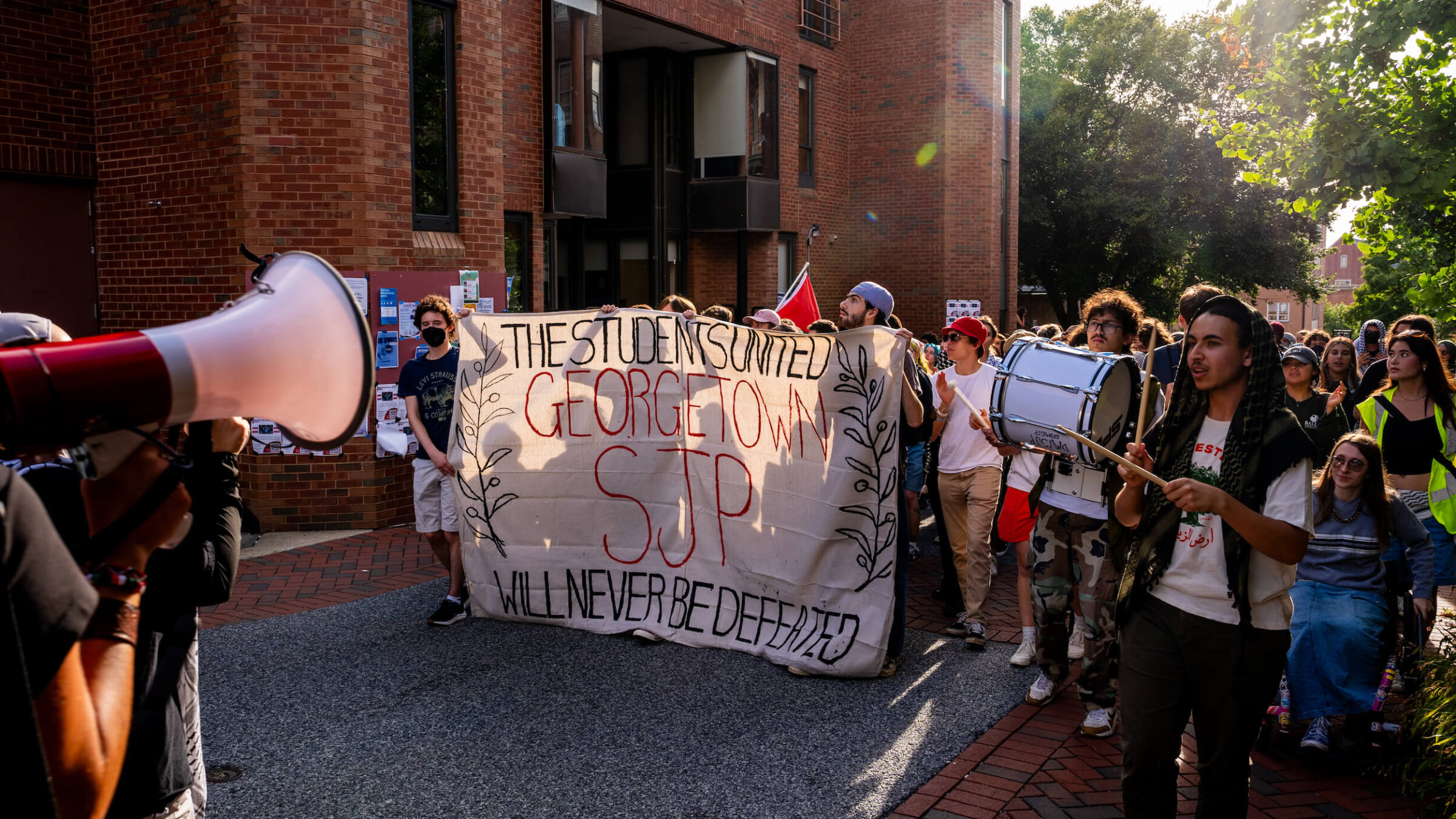Campus protests defined the year since Oct. 7. Could they actually change U.S. policy?
The pro-Palestinian student camp captured the popular imagination. Making real change is a different matter

Georgetown University students march during a pro-Palestinian protest on Sept. 4. Photo by Andrew Harnik/Getty Images
Student protests against the war in Gaza have been making the news for almost a year. But can these students actually hope to influence U.S. policy on the Israeli-Palestinian conflict? One year since Oct. 7, it’s a vexing question.
There are at least two key matters to consider in answering it: What kinds of protests are effective in shaping public opinion, and how much does foreign policy even matter to voters? Public opinion, and voter preference, after all, both play a critical role in determining policy.
On the first question, research has shown that protests can and do shape public opinion. But the kind of protest also matters. And the evidence is clear. The kinds of peaceful demonstrations that college administrators and politicians across the political spectrum have called for tend to be less effective, largely attracting participants who were already sympathetic to the cause in question. It’s more disruptive actions — like the wave of campus encampments last spring — that actually stand a chance of meaningfully changing public opinion.
What does that mean for the future of the student protest movement? To make an informed prediction, we first need to understand the scope of the students’ demands, and identify the gains they’ve achieved so far.
Most of these protesters have called for their university to divest resources from companies that assist the Israeli military, and sever academic ties to Israeli universities.
On the issue of financial divestments, while relatively few university administrations have changed tack, there have been some notable successes. Among them: Northwestern University committed to financial disclosure. Brown University promised a vote on divestment. Evergreen State College established a divestment task force.
Student demands to sever academic exchanges and other cooperative agreements with Israeli universities have proved more contentious. Many administrators and faculty members view such actions as a breach of academic freedom, even though the American Association of University Professors recently reversed its longstanding opposition to academic boycotts. But some protesters have found other routes to success — like at Rutgers University, where they succeeded in getting their administration to agree to increase opportunities for students to study Arab culture, and to host displaced Palestinian students from Gaza.
What these mixed successes show us: The campus protest movement has been disruptive enough to effect some change, but relatively little compared to the scope of the movement at large. If they want to succeed at provoking real change in U.S. foreign policy, they’ll need to consider what new routes toward disruption might be available.
As for whether the protests have succeeded in shaping public opinion, the data does not paint a rosy picture. A Pew survey of Americans in March 2024 — roughly a month before the headline-making campus encampments got underway — found that while a majority believed that Israel does have a valid reason for going to war against Hamas, only 38% found Israel’s military conduct of the war acceptable. (34% said it’s unacceptable; 25% were unsure.)
By July, while disapproval of Israel’s actions had risen, a Gallup poll showed an increase in public approval for Israel’s war in Gaza. After three months of student protests, 42% of U.S. adults approved of Israel’s actions— up six points from a March Gallup poll — and 48% disapproved, down seven points from the March poll.
Even if the encampments appeared correlated to an increased number of Americans opposing Israel’s war conduct, we don’t have data on whether the change in attitudes was a result of the encampments or a result of the rising death toll in Gaza. The fact that polling showed positive trends in Americans’ attitudes toward Israel in the wake of the protests is, in its own way, telling.
Part of what it shows: Most voters even care relatively little about foreign policy. A Pew survey of Americans from September shows foreign policy ranks fourth in voter concerns, well behind the economy, and just behind health care and Supreme Court appointments.
Still, looking ahead to the upcoming American elections, the rise of the uncommitted movement during this year’s Democratic Party primary suggests that at least some Democratic voters might prioritize Israel-Palestine issues more than they had previously. That bodes well for the student protest movement — if it can build on its successes to date.
The most significant of those successes is the most obvious: The encampments became the most visible symbol of a broad American reckoning with the role U.S. aid has played in the destruction of Gaza.
They may not yield immediate fruit, but like student actions in past protest movements, their success in building a compelling, motivating narrative represent a key step in movement building.
History teaches us that the tides of change often stem from grassroots activism like this. As past generations fought against slavery, women’s disenfranchisement and apartheid, today’s students are reshaping the discourse on human rights.
Whether these students’ efforts translate into policy shifts remains uncertain, but their voices are undeniably carving a new path in American political culture.















